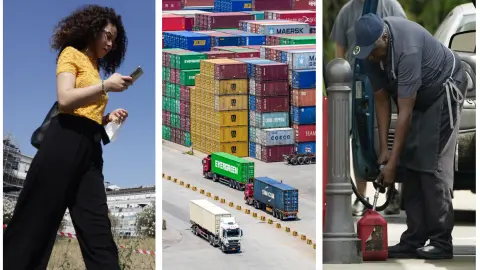Asia’s food security – a prisoner’s dilemma
Although energy security has been top of mind since the start of the Russia-Ukraine war, in Asia at least, fears over food security are now being driven by 'food hoarding'
The food domino run
The loss of wheat and sunflower exports from Russia and Ukraine has had clear knock-on effects on many Asian staples. It is also argued by some that China's stockpiling of some foodstuffs is exacerbating this problem.
Within the sphere of grains and cereals, Thai Jasmine rice is up 45% from its November 2021 low. In the edible oils space, palm oil, which is found in everything from noodles to cookies, is up close to 65% over the last 12 months. Such increases also push up animal feedstock prices (soy, corn), and in turn, meat (though recovery from last year’s swine fever problems is keeping this more subdued for the time being).
Looking ahead, rising fertiliser prices - a function of natural gas prices, which have also surged - as well as rising diesel prices, threaten planting and future crop yields and prices. This is especially true for poorer nations where difficult choices often have to be made about planted acreage and fertiliser usage.
Export bans to keep inflation limited
The negative consequences of these price increases reach beyond simple cost of living concerns. For example, the debt default by Sri Lanka and ensuing civil and political unrest are at least partly a function of rising global food (and energy) prices. And what is happening there shows that national security and food security are inextricably linked. It is perhaps with a sense of self-preservation in mind, that some governments in Asia have been looking to deal with the problem of rising food (and other) prices by keeping domestically produced food at home, rather than exporting it.
For example, India has imposed curbs on wheat and sugar exports (albeit the latter at a relatively high level of 10m tonnes). Indonesia has imposed export bans on some palm oil products. Malaysia, with relatively low inflation right now is seeking to capitalise on this by dropping its export taxes on palm oil. It has, however, imposed a ban on exports of chicken, much to the alarm of neighbouring Singapore, which is 90% reliant on imported food.
World's biggest rice exporting nations

What's good for me might be bad for you, and actually me too
In every country in Asia right now, food price inflation is pushing overall inflation higher, and this could have further to go. For example, there is now concern that India, the world’s biggest exporter of rice, is thinking of limiting rice exports to prevent further food price increases domestically (Indian food price inflation touched 8.4% in April). If it did, it may spur further export curbs elsewhere in Asia to preserve food security, but which would in fact actually worsen it. Asia accounts for about 85% of global rice exports. This is basically a classic version of the prisoner's dilemma, where individual actions aimed at reducing an economic cost can collectively generate a much worse outcome.
One upside risk is that the monsoon season has already started well, which may take some pressure off food prices, and any ensuing actions to keep them subdued.
Difference between food inflation and core inflation in Asia

Central Banks - hiking but not totally clear why
If there is a role for central banks in all of this, it isn’t 100% clear what that is. Certainly, higher rates can help reduce overall demand and take the pressure off rising prices. Though as food demand is extremely price-inelastic, this may only work by further reducing demand for other goods and services, and that is maybe where growing recession fears stem from. With few other choices, and currency weakness not a viable option in the face of rising global food and energy prices, more rate hikes across the region do look inevitable, though it is less clear what they hope to achieve.
This publication has been prepared by ING solely for information purposes irrespective of a particular user's means, financial situation or investment objectives. The information does not constitute investment recommendation, and nor is it investment, legal or tax advice or an offer or solicitation to purchase or sell any financial instrument. Read more
Download
Download article
1 June 2022
ING Monthly: Searching for the silver lining This bundle contains 16 Articles